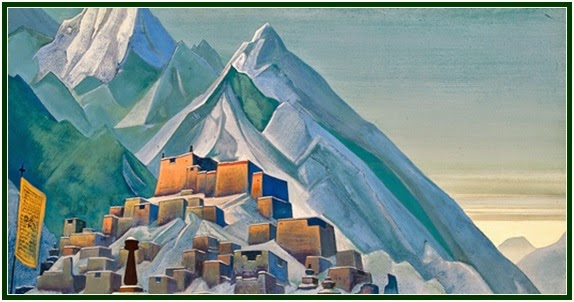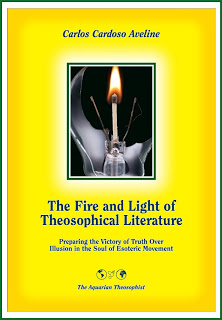
The Universal Wisdom, Expressed In a Few Words
Helena P. Blavatsky

The Himalayas: part of a painting by Nicholas Roerich
00000000000000000000000000000000000000000
A 2014 Editorial Note:
In 1890, a compilation was published in
London of Eastern thoughts which had been
collected and written down by H. P. Blavatsky.
It presented one idea for each day of the year
and had the title “Gems From the East”. The
book is now part of volume XII in the “Collected
Writings” of H.P.B. (TPH, USA, pp. 425-476).
The following axioms are a partial selection from
the months of April and May. We recommend the
reading of the whole work. The practical usefulness
of these precepts and axioms is in direct proportion
to the attention and determination with which they are
examined by the student, and preserved in his memory.
(Carlos Cardoso Aveline)
00000000000000000000000000000000000000000000000000000
* He who leaves the society of fools, cleaves unto the wise.
* Patience leads to power; but eagerness in greed leads to loss.
* Three things make a poor man rich: courtesy, consideration for others, and the avoidance of suspicion.
* When trust is gone, misfortune comes in; when confidence is dead, revenge is born; and when treachery appears, all blessings fly away.
* He who wished to reach Buddhahood, and aspires to the knowledge of the Self-born, must honor those who keep this doctrine.
* As the spider moving upward by his thread gains free space, thus also he who undertakes moving upward by the known word OM, gains independence.
* The wheel of sacrifice has Love for its nave, Action for its tire, and Brotherhood for its spokes.
* Man consists of desires. And as is his desire, so is his will; and as is his will, so is his deed; and whatever deed he does, that he will reap.
* A stone becomes a plant; a plant a beast; the beast a man; a man a Spirit; and the Spirit – GOD. [1]
* There exists no spot on the earth, or in the sky or in the sea, neither is there any in the mountain-clefts, where an evil deed does not bring trouble to the doer.
* Whoever, not being a sanctified person, pretends to be a Saint, he is indeed the lowest of all men, the thief in all worlds, including that of Brahma.
* If a man consorting with me (Buddha) does not conform his life to my commandments, what benefit will ten thousand precepts be to him?
* He who smites will be smitten; he who shows rancor will find rancor; so, from reviling cometh reviling, and to him who is angered comes anger.
* Like a beautiful flower, full of color, but without scent, are the fine but fruitless words of him who does not act accordingly.
* When your mind shall have crossed beyond the taint of delusion, then will you become indifferent to all that you have heard or will hear.
* The wise guard the home of nature’s order; they assume excellent forms in secret.
* If thou losest all, and gettest wisdom by it, thy loss is thy gain.
* Empty thy mind of evil, but fill it with good.
* Great works need no great strength, but perseverance.
* Sleep is but birth into the land of Memory; birth but a sleep in the oblivion of the Past.
* To forgive without forgetting, is again to reproach the wrong-doer every time the act comes back to us.
* Every man contains within himself the potentiality of immortality, equilibrated by the power of choice.
* He who lives in one color of the rainbow is blind to the rest. Live in the light diffused through the entire arc, and you will know it all.
* Every time the believer pronounces the word OM, he renews the allegiance to the divine potentiality enshrined within the Soul.
* The eternal Spirit is everywhere. It stands encompassing the whole world.
* One moment in eternity is as important as another moment, for eternity changeth not, neither is one part better than another part.
* Better it would be that a man should eat a lump of flaming iron than that one should break his vows.
* Purity and impurity belong to oneself; no one can purify another.
* Who is the great man? He who is strongest in patience. He who patiently endures injury, and maintains a blameless life – he is a man indeed!
* If thou hast done evil deeds, or if thou wouldst do them, thou mayest arise and run where’er thou wilt, but thou canst not free thyself of thy suffering.
* There is a road that leads to Wealth; there is another road that leads to Nirvana.
* An evil deed kills not instantly, as does a sword, but it follows the evil-doer into his next and still next rebirth.
* Nature is upheld by antagonism. Passions, resistance, danger, are educators. We acquire the strength we have overcome.
* As a person having seen one in a dream, recognizes him afterwards; so does one who has achieved proper concentration of mind perceive the SELF.
* It is better to do one’s own duty, even though imperfectly, than to perform another’s duty well.
* The wise who knows the Self as bodiless within the bodies, as unchanging among changing things, as great and omnipresent, does never grieve.
* The path of virtue lies in the renunciation of arrogance and pride.
* He who wrongs another unjustly will regret it, though men may applaud him; but he who is wronged is safe from regret, though the world may blame him.
* There is more courage in facing the world with undisguised truth, than in descending into a wild beast’s den.
* True clemency is in foregoing revenge, when it is in one’s power; true patience is in bearing up against disappointments.
* The happy man must prepare ere the evil day comes; and when it does, let the thought that every good and great man has been made to suffer at some time console him.
* As the night follows the day, so misfortune is the shadow of joy; Karma bestowing her lots with both hands.
* The eagle catcheth not flies; but even the eagle is disturbed by them.
NOTE:
[1] This axiom is quoted in HPB’s book “The Secret Doctrine”. (CCA)
000
On the role of the esoteric movement in the ethical awakening of mankind during the 21st century, see the book “The Fire and Light of Theosophical Literature”, by Carlos Cardoso Aveline.

Published in 2013 by The Aquarian Theosophist, the volume has 255 pages and can be obtained through Amazon Books.
000